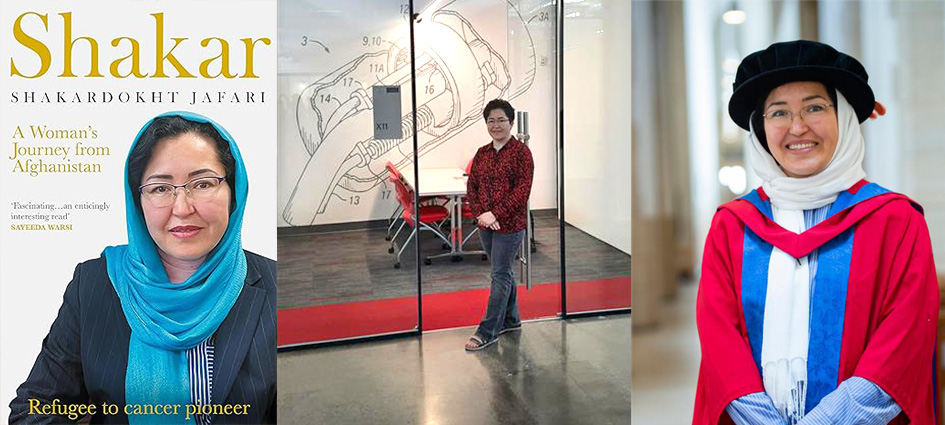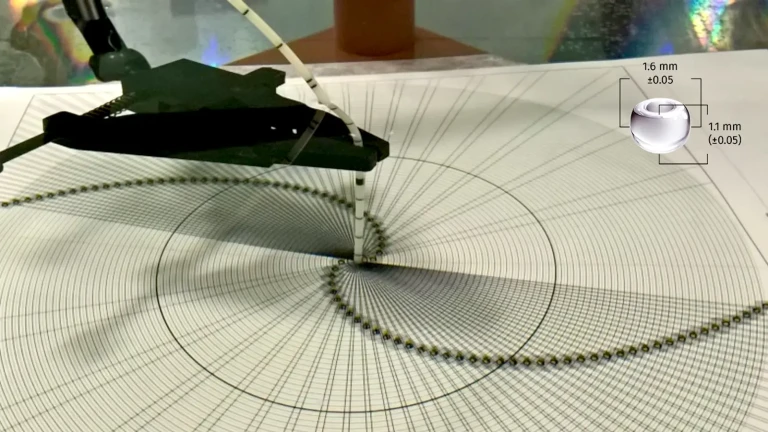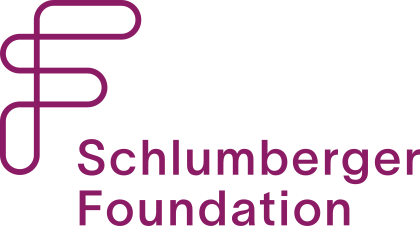
Celebrating Extraordinary Faculty for the Future Fellows: Dr. Shakardokht Jafari—Refugee to Cancer Pioneer
When Dr. Shakardokht Jafari crossed the Iranian border as a six-year-old refugee from Afghanistan, no one could have imagined the path ahead. From a child displaced by war to an award-winning medical physicist and cancer technology innovator, her story—now captured in the memoir Shakar: A Woman’s Journey from Afghanistan—is one of extraordinary resilience, visionary science, and an unyielding belief in the power of education.
From Rural Afghanistan to the Cutting Edge of Cancer Research
Shakar’s journey defies expectation at every turn. Raised in a conservative rural Afghan family, she resisted multiple arranged marriages and, against all odds, pursued a degree in radiation technologies at Tehran University of Medical Sciences. After the fall of the Taliban, she returned to Kabul to help rebuild the country’s cancer care infrastructure. It was here that she began to understand how vital international support and continued study would be—both for herself and for the communities she hoped to serve.
The Fellowship That Kept the Door Open to the Future
That support came in the form of a Schlumberger Foundation Faculty for the Future Fellowship. At a moment when she was preparing to give up her studies due to financial hardship, the Fellowship offered more than just funding—it was, as Shakar says, “a lifeline that kept the door open to my future.” The Fellowship allowed her to complete her PhD in medical physics in the UK, setting Shakar on a trajectory that would reshape not only her life, but the field of cancer radiotherapy.
TRUEinvivo®: A Life-Saving Innovation
Today, Shakar is the founder and CEO of TRUEinvivo®, a startup delivering high-precision dosimetry solutions for radiotherapy. Using micro glass beads, the company’s technology offers fast, accurate measurement of radiation doses in cancer treatment—paving the way for safer, more effective care and adaptive radiotherapy. The innovation has already entered research trials in the UK for cervical and prostate cancers.

TRUEinvivo® is on the cusp – at that critical moment between early-stage innovation and revenue-generating growth. Shakar is looking forward to what the next few years will bring for the company.
Rebuilding Education from the Ground Up
When political change halted her efforts to establish a cancer centre in Kabul, Shakar turned her focus to a broader mission to support her homeland: education. As Chairperson of Education Bridge for Afghanistan (EBA), she leads an ambitious initiative to provide girls and women with access to learning despite Taliban-imposed restrictions.
“We say we turn every home into a school,” she explains. Through downloadable video lessons, USB-based materials, volunteer-led tutorials, bi-weekly assessments, and international accreditation, EBA is creating a new model of education—one that functions beyond the control of oppressive regimes.
Scaling Hope: 12,000 Students and Growing
EBA officially launched registration in March 2025, after two years of groundwork. Within just two weeks, over 12,000 students signed up—many from informal schools or isolated homes. Most of those enrolled are girls and women; the remainder includes boys, often in refugee camps or areas with no access to schooling.
The project operates with minimal internet requirements and growing global support. Assessment centres inside Afghanistan discreetly administer exams, while a UK-based examination board ensures the credentials are internationally recognised. EBA now aims to expand into A-levels, Level 4 and 5 certifications, and even higher education.
Technology, Trust, and Tenacity
EBA’s growth depends not only on technology, but also on trust. Shakar was invited to lead the initiative by members of the Afghan diaspora who admired her integrity and clean track record. “At first, I said I couldn’t help—I was in cancer treatment. But they said, ‘We need your name.’” Most of that original team has since moved on, but Shakar stayed—rallying a new group and pressing forward, one solution at a time.
One of her closest collaborators is a former telecommunications minister of Afghanistan, Mr Abdul Razaq Vahidi—once jailed for exposing corruption—now working tirelessly from Turkey to build the programme’s digital infrastructure. Together with the wider team of volunteers, they are laying the groundwork not only for education, but for future systems in health, finance, and governance: tools to build a fairer society from the ground up.
The Power of Educating Women in STEM
At the heart of Shakar’s story is a powerful truth: educating women in science and technology changes everything. Through her own pursuit of STEM, Shakar transcended the limitations placed on her by tradition, politics, and poverty. Today, she is using that education to build new systems, save lives, and empower thousands of others to do the same.
“Education is not a weapon in their hands anymore,” she says of oppressive regimes. “It’s a lifeline in ours.”
The Faculty for the Future programme didn’t just fund her studies—it made space for a new kind of leadership to emerge. One that is courageous, innovative, and rooted in empathy. And one that proves, beyond doubt, that when women are given the tools of science, they build futures that benefit us all.
Find Out More
To learn more about Shakar’s journey and support the ongoing work of Education Bridge for Afghanistan, visit: https://trueinvivo.co.uk and https://eba.ac/
Shakar: A Woman’s Journey from Afghanistan is available now.
